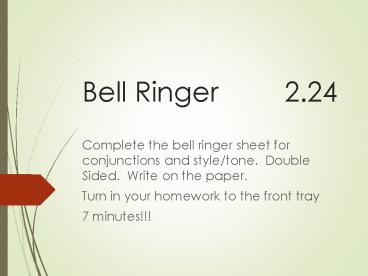Bell Ringer2.24 - PowerPoint PPT Presentation
1 / 17
Title:
Bell Ringer2.24
Description:
Anti-Transcendentalism Herman Melville Nathaniel Hawthorne ... Times New Roman Arial Century Gothic Wingdings 3 Wisp 1_Wisp 2_Wisp 3_Wisp 4_Wisp 5 ... – PowerPoint PPT presentation
Number of Views:128
Avg rating:3.0/5.0
Title: Bell Ringer2.24
1
Bell Ringer 2.24
- Complete the bell ringer sheet for conjunctions
and style/tone. Double Sided. Write on the
paper. - Turn in your homework to the front tray
- 7 minutes!!!
2
Conjunctions
- Spaghetti is now commonplace in Great Britain,
for this has not always been the case. In 1957,
the British Broadcasting Company aired a
three-minute story claiming that spaghetti grew
on trees, as an April Fools Day joke. The film
showed loopy strands of pasta being harvested
on a family farm in Switzerland. It was then
laid out to dry in the sun for several hours, so
all the moisture evaporated. - The segment claimed that, apart from an
especially mild winter, the years spaghetti
harvest would be a bumper crop. It also
explained that the uniform length of the
spaghetti strands was the result of extensive
breeding by farmers. The films authoritative
voice made it seem plausible, and many Britons
were taken in by the prank.
3
Conjunction Notes
- WRITE THESE DOWN!!!
4
Additive Conjunctions
- Conjunctions that simple add more information to
what is already there. - Examples
- And, also, in addition, not only but also,
moreover, further, besides
5
Replacement Conjunctions
- Conjunctions that replace one piece of
information with another. That is, they offer an
alternative. - Examples
- Or, or else, alternatively.
6
Comparative Conjunctions
- Conjunctions that are used to link two ideas that
are considered to be similar - Examples
- In the same way, likewise, just as, both and
7
Contrastive Conjunctions
- Conjunctions that like two ideas that are
considered to be different. - Examples
- But, however, in contrast, on the contrary,
instead, nevertheless, yet, still, even so,
neither nor
8
Concessive Conjunctions
- A subgroup of contrastive conjunctions. They are
used to contrast one idea with another where one
place of information appears to be surprising or
unexpected in view of the other idea. - Examples
- Though, although, despite, in spite of,
notwithstanding, whereas, while - Even though money has been poured into literacy
programs, literacy levels among 12-15 year olds
do not appear to be improving.
9
Resulting Conjunctions
- The conjunctions introduce a result to the
previous idea. - Examples
- Due to, until
10
Questioning
- Right There Questions A question whose answer
is right in the text all you have to do is
locate it and copy it down. - Pulling It Together Questions A question whose
answer in in the text, but you have to pull it
together from different parts of the text you
cant simply copy it down from one place. - Author and Me Questions A question whose answer
is not in the text itself. The reader has to use
the information provided in the text and his/her
own knowledge to figure out the answer. In other
words, the author provides information that can
help answer the question, but does not provide
the answer itself. - On My Own Questions A question whose answer is
not in the text itself. The reader does not have
to have read the text to answer the question, but
reading the text will likely inform his/her
answer to the question.
11
Instructions for NOW
- Annotate the printed notes for Anti-Transcendental
ism. - Make sure you are annotating EVERY slide!
- Write 4 questions, one from each level, regarding
the notes. - Use the question stems on the back of the paper.
- Not being on task will result in losing class
points. Point loss will affect your progress
report.
12
Anti-Transcendentalism
- Herman Melville
- Nathaniel Hawthorne
- Edgar Allen Poe
13
Reasons / Causes
- Opposed the optimism and naïve idealism of the
transcendentalists - Dwelt on guilt and remorse over past sins
- Discontented with current circumstances in America
14
Key ideas / Philosophies
- Belief in the potential destructiveness of the
human spirit - Belief in individual truths, but no universal
truths, and the truths of existence are deceitful
and disturbing - Human nature is inherently sinful (original sin)
and evil is an active force in the universe - Focus on the mans uncertainty and limitations in
the universe
15
View of Nature
- Nature is vast and incomprehensible, a reflection
of the struggle between good and evil - Nature is the creation and possession of God and
it cannot be understood by human beings
16
Writing Style
- Man vs. Nature conflicts bring out the evil in
humanity - Raw and morbid diction
- Focus on the protagonists inner struggles
- Typical protagonists are haunted outsiders who
are alienated from society - Prevalent use of symbolism
17
The Dark Romantics
- Dark Romantics believed that spirituality is
found in nature, BUT not everything in nature is
good or harmless - Focused on the dark side original sin, the
conflict between good and evil, the effects of
guilt, sin, and madness - Wrote about the horror of evil































